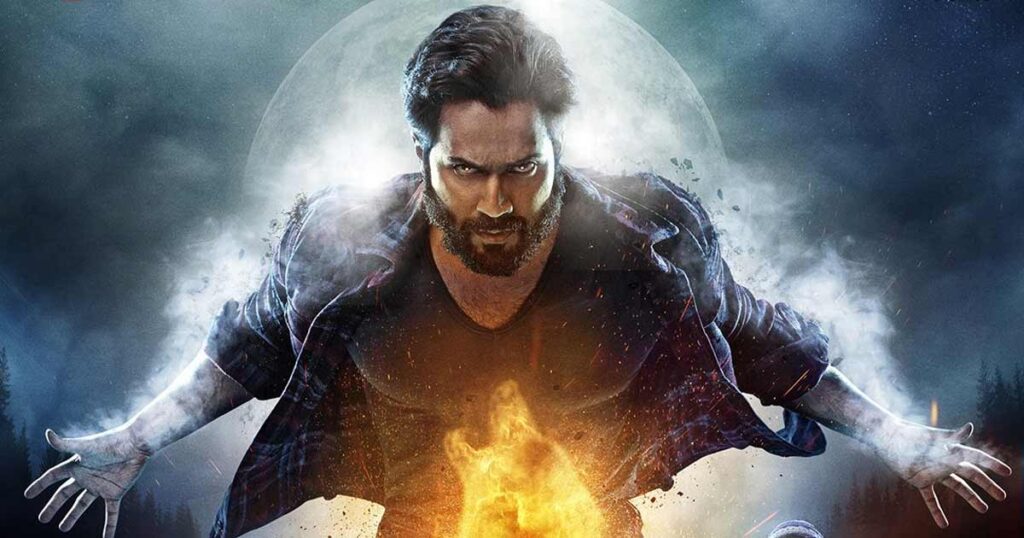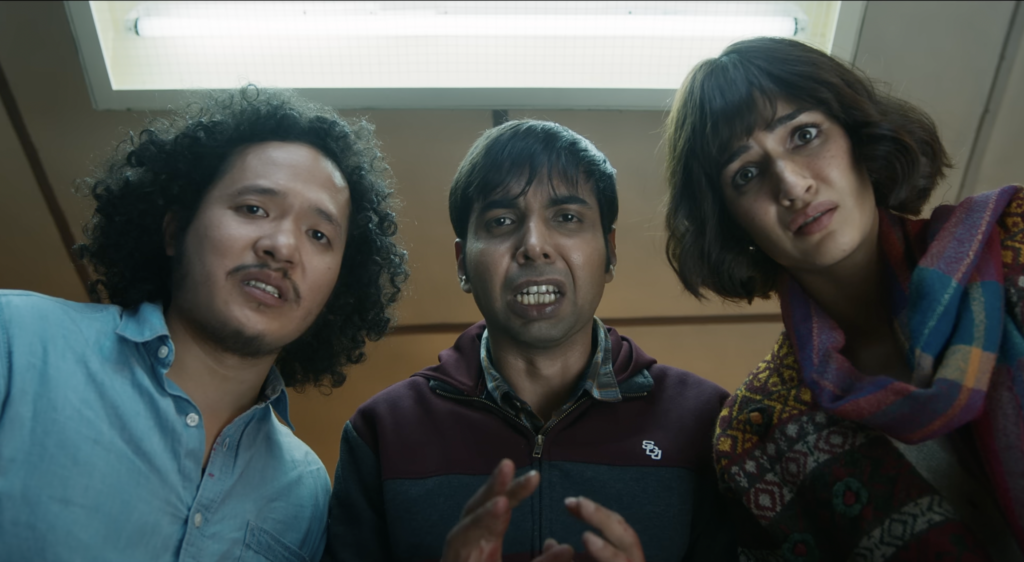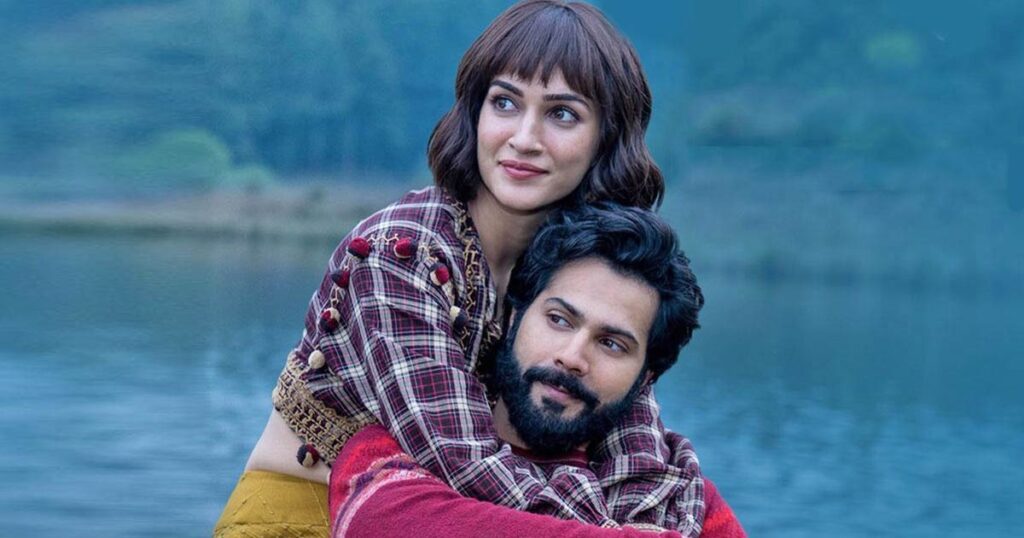The best jokes are often the ones not intended for laughter.
Bhediya is an imaginative triumph. And the source code of its success resides in the jocular belief system. The film doesn’t take itself seriously and that turns into a gift that keeps on giving.
From a bird’s-eye view, Bhediya is an environment satire wrapped in the horror comedy foil.
A realist conflict perched atop fantastical aftermaths, the film carries an outlook which doesn’t aim to reform or demonise the society, but rather cartoonise it.
Racist humor, insensitivity and feudalism are ingrained in each characters vices – what you choose to chuckle at slyly reflects the bias programmed within. Romance, thankfully is minimal and low-key, allowing the hilarity to gallop.
Bhediya oscillates between being a character-driven film to a plot-driven tale like a hypnotist’s chain. The film swaps cues from characters to plot wherever dullness tends to lurk.

Still from BhediyaYou’re always invested, infested by either grossing out at snarky-shot excreta or a tail wagging CGI standout. You’re in for the ride and it doesn’t disappoint.
Amar Kaushik’s comedies are of the wisecrack sort. It comes from a space of self assurance. The more secure a person you are, the better shall be your self-deprecating humor.
Bhediya claims pride at finger-poking itself and owning it’s shortcomings. Plot devices done to death or tropes trembling on the crutches of time, Bhediya takes jibes at its own creative limitations and not just addresses the elephant in the room, but trains it to dance.
Most crucially, Bhediya gets its inherent politics right.
No ass-pleasing or detesting accompany the narrative. The film mocks the universe equally. The film also doesn’t suffer from the savior syndrome that recent films have been plagued with, whenever the premise is set in Northeast of India.
The North Easterners here are smart, tuned in and most importantly normal life an Indian should be. Neither war torn survivors nor chilled out Hillbillies, Arunachalis in this film, led by the seamless performance of Paalin Kabak are finally somewhat geographically and culturally appropriate. Yet, there’s long way to go and understand that Northeastern hill rangers aren’t as poverty-stricken as mainland stigma imagines them to be.
Which leads us to the serious stuff in the film – the conflict.

Still from BhediyaTum karo pedon se pyaar toh amrit barsega. The very idea of a deforestation story placed in Arunachal Pradesh is generic. The foundation lacks inventiveness and the consequent world building is also pretty sketchy in the film.
The practical portions of the film are half-baked and not well researched. Perhaps, a better study of the roadway politics and mafia could’ve rendered the film sufficient more plot points and arcs but that’s a story for another day, another film probably.
This whole clunky fray seems passable for the film, as mentioned, isn’t here to prove a point but screw around with it. The journey isn’t saving the green but shooing away the whacked out werewolf within. The Bhediya.
And the Bhediya is a riot.
Every frame of the supernatural-spirit animal is a blast. The killings are aesthetically acidic and satisfying – an avenging forest guard-dog ravaging apart petty humans. Social commentary garnished with punchy dialogues spray wit on a plaster of the good ole’ slapstick. Some jokes are so meta, Zuckerberg might want to buy them.
Bhediya works because it tickles you so hard, you let go of the fact that it bit your bum a while ago.
Bhediya is a raging soul and Abhishek Banerjee is its throbbing heart. An actor with shapeshifting abilities, Banerjee plays the jester of this court and smacks every scene out of vicinity with his impeccable and elusive comic timing. This man is a massive credit to the Hindi film industry. A rare, irreplaceable talent.
In the melee, Kriti Sanon’s role gets warped in a catch 22 situation. A character that could’ve been much better written and provided more meat. But commendable how she makes chicken salad out of the chicken shit presented to her and works towards the payoff. A very selfless and benevolent performance, in hindsight. The woman’s a team player.

Still from BhediyaVarun Dhawan is at a very interesting point in his career. Statistically, one of the most successful Indian actors ever, the man hasn’t yet been coroneted with the marquee status he so rightfully deserves. A pro-wrestling/sports entertainment fanatic, Dhawan’s career trajectory is akin to that of WWE Superstar Cody Rhodes.
Generational talent stuck in the undercard – leaves company – works around the world and returns home as a megastar. This is Varun Dhawan’s made-man year and Bhediya is his WrestleMania 38. Took him ten years to break the proverbial glass ceiling.
The torch hasn’t been passed. Dhawan has snatched it. As his favourite Dwayne “The Rock” Johnson would quote, Varun Dhawan has Layeth The Smacketh Down!
Writer Niren H. Bhatt and director Amar Kaushik have a notorious entertainer. Bhediya is the assclownery we need in this world too worked up.
And if the post-credit scene is a cue, safe to assume that madness has just entered the chat.